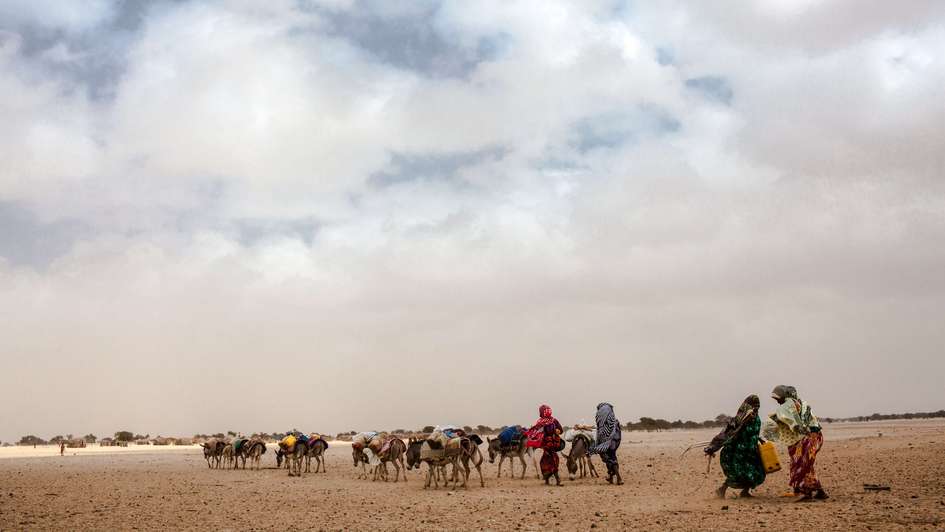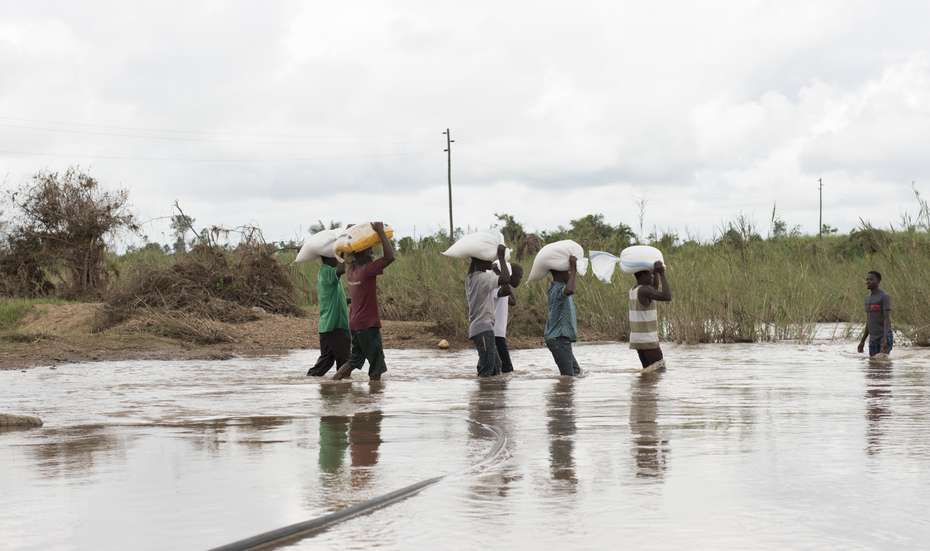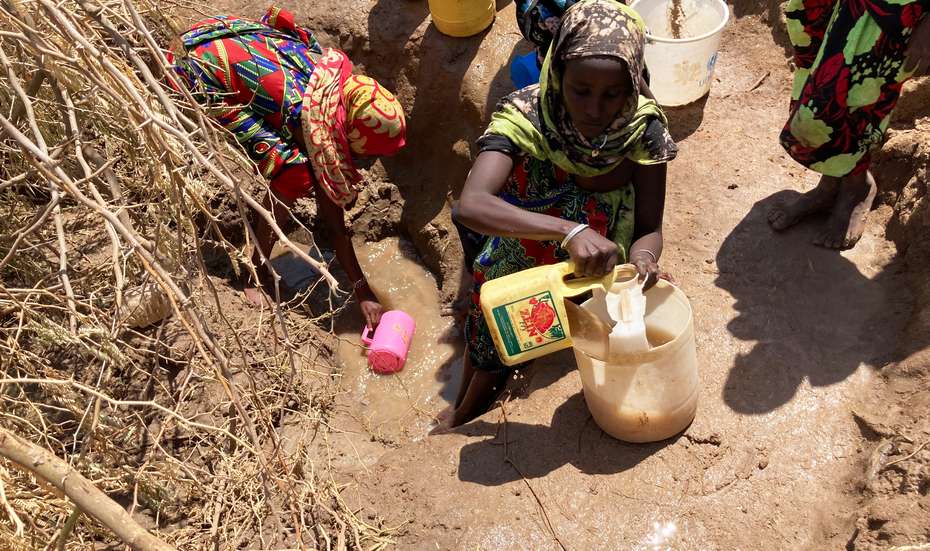Welthungerhilfe's new policy brief describes the requirements for the COP in more detail:
COP 26: The climate conference that failed the South
The results of the 2021 climate conference in Glasgow are sobering. Michael Kühn, Senior Advisor for Climate Change Policy on the results of COP26.

This year's Conference of the Parties to the UN Framework Convention on Climate Change (COP 26) in Glasgow has been awaited by observers with much excitement and high expectations. The impressions of floods, forest fires, storm damage, heat waves in all parts of the world are too intense for humanity not to be aware that the consequences of climate change are hitting with full force and destroying livelihoods, not to mention the hunger figures in the Global South, which are rising again. If one measures the results of the climate conference by the urgency of action, it was another climate policy failure, if one takes note of the small, encouraging progress, there could be reason to hope that global warming will not exceed the 2 degrees Celsius limit by the end of the century. However, this requires that the states immediately switch from an announcement mode to an implementation mode. And this cannot ignore the fact that we are amid a global pandemic, which is tying up resources in many cases, and geostrategic power struggles between some of the negotiators are preventing constructive dialogue. The chances are rather mixed.
The Glasgow Pact
Outside the negotiating framework of the COP, several things have been announced that can certainly be seen as positive: The text of the so-called Glasgow Pact provides for a gradual phase-down from coal. There is no doubt that it would have been better to say, "phase out," but China and India got their way at the last minute and weakened the text. But this also includes the fact that a total of 20 countries, among them Vietnam, Morocco, and Poland, have announced that they will no longer build any new coal-fired power plants. It is the first time that a COP final text mentions a phase-out of coal and fossil fuels at all.
Twenty-two countries have also pledged to phase out the internal combustion engine by 2035 and increase the share of zero-emission new cars and vans to 100%. Major carmakers from China, Germany, France, Japan, and the U.S. have not joined. Germany was also not represented in an initiative launched by Denmark and Costa Rica to phase out oil and (fossil) natural gas production.
141 countries pledged at the COP to secure funding for sustainable agriculture, forest management and conservation and restoration, and to halt deforestation. Methane emissions - methane is, along with CO2, a greenhouse gas produced primarily in industrial agriculture - are to be reduced by 30% by 2030. That's what 103 countries have agreed to.
Oh yes, and an affirmation to resolutely pursue the 1.5-degree target is also mentioned in the Glasgow pact.

Negotiations on how to deal with damage and losses must largely be considered a major failure.
Michael Kühne Senior Advisor Climate Change PolicySo, there are various initiatives dedicated to greenhouse gas reduction, the only catch is that there are still many countries that are not prepared to reduce their greenhouse gases in the next ten years and thus global warming will continue for the next few years. While the call for countries to strengthen their 2030 reduction targets by next year is undoubtedly an important step, taking into account the gaps between announcement and implementation, it is by no means certain that the 2- or 1.5-degree target will even be reached by the end of the century.
This is how UN Secretary-General Antonio Guterres summed it up in a statement at the close of COP 26: the texts would include "important steps, but unfortunately the collective political will was not sufficient to overcome some deep contradictions." He went on to say that the conference failed to achieve the goals of ending fossil fuel subsidies, phasing out coal, putting a price on carbon, building the resilience of vulnerable communities, and meeting the pledge of $100 billion in climate finance to support developing countries.

Climate finance
Thus, there is also a mixed record in climate financing: The $100 billion that industrialized countries are supposed to provide annually for developing countries from 2020 on, will not be reached until 2023, the participants self-critically acknowledged. Countries from the Global South called that fraud. This breach of trust clouded further negotiations on a new financial target for the period after 2025. The African Group insisted on a sum of between at least $750 billion and $1.3 trillion, while the industrialized countries remained silent on the figure to be targeted.
The situation is somewhat different when it comes to replenishing the Adaptation Fund (AF). For the first time, the U.S., Canada and Qatar are also paying into the AF, giving it $365 million in additional funds (the target was $120 million). The EU remains the largest donor with 116 million. Germany had announced an additional 50 million euros. The final text also includes a call for Parties to double their adaptation funding for developing countries by 2025 compared to 2019.
Disappointment over damage and loss
For the most part, the negotiations on how to deal with damage and loss must be considered a major failure. The results achieved will foreseeably not lead to adequate support for the affected states and people. Countries such as the U.S., Japan and France blocked the establishment of funds proposed by the G-77/China to finance damage that has already occurred or that cannot be avoided (loss and damage), primarily out of fear of liability consequences and with reference to not duplicating funding for humanitarian aid. Civil society observers called the outcome a "betrayal" of millions of people already suffering from climate change. Only a dialogue process was set in motion, which should lead to the establishment of a fund in the medium term. Developing countries expressed "extreme disappointment" that no clear plan for future financing of loss and damage was agreed.

COP 26: interests of developing countries negated
"...From the perspective of developing countries, which are hard hit by climate change, the pledges and actions are inadequate. The damage and consequences of climate change and urgently needed adaptation measures, and the development of renewable energy structures is insufficiently supported." This is how the German Minister for Economic Cooperation and Development, Gerd Müller, commented on the results of COP 26, saying that the agreements were far too non-binding overall. In addition, the poorest countries were in danger of being left out of the picture. From the perspective of the developing countries, the results were insufficient, too small-scale and too slow. More speed is needed. Glasgow did not provide a satisfactory answer to the question of protecting poorer countries from the consequences of climate change. By the next summit, it must be clear how developing countries, as the main victims of climate change, can be better supported in adaptation measures and climate-neutral development. This requires climate burden sharing from rich to poor to better protect people in developing countries from climate impacts such as droughts and floods. Developing countries need reliability to be able to cope with the consequences of climate change and expect trillions in support from rich countries.
The president of the Federation of German Industries (BDI) also criticized the outcome, with President Russwurm saying that "the urgently needed major breakthrough was not achieved" in Glasgow. "In the fight against global warming, stronger international cooperation and binding climate targets from virtually all countries are essential. What was achieved in Glasgow is not enough," he said. Countries showed widely varying levels of ambition, he said, ultimately shifting emissions to countries with less stringent climate policies and burdening businesses in more ambitious regions like the EU. "The watered-down final text on the global coal phase-out makes it clear that German industry will not be able to operate on a level playing field in the future." Russwurm criticized the fact that rich countries have not yet made good on their promise to provide $100 billion a year in climate finance to poorer countries. "This further gambles away trust in the common fight against climate change."
Conclusion
The small positive steps that COP 26 has brought must not be confused with a departure that will now halt climate change. To gloss over a watered-down final declaration as a "step in the right direction" makes a mockery of the people of the Global South, for whom the day-to-day struggle against climate change continues relentlessly. Nonetheless, it is possible that this COP will be seen retroactively as the one that launched the global coal phase-out.








